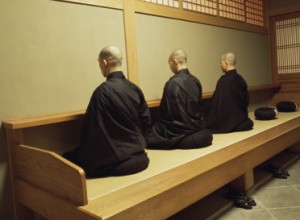Even for people adept at the art of methodless meditation, ‘the beginner’s mind’ can have the connotation of someone just learning how to meditate, a novice. It can imply someone who is just starting out on the spiritual path. But that isn’t what it means at all.
 The phrase “beginner’s mind” is a concept from Zen Buddhism that was popularized by Zen teacher Shunru Suzuki, in his book, “Zen Mind, Beginner’s Mind,” published in 1970 in Palo Alto. A famous quote from Suzuki, which conveys an insight that has yet to penetrate this culture, is: “In the beginner’s mind there are many possibilities, in the expert’s mind there are few.”
The phrase “beginner’s mind” is a concept from Zen Buddhism that was popularized by Zen teacher Shunru Suzuki, in his book, “Zen Mind, Beginner’s Mind,” published in 1970 in Palo Alto. A famous quote from Suzuki, which conveys an insight that has yet to penetrate this culture, is: “In the beginner’s mind there are many possibilities, in the expert’s mind there are few.”
However my intent here is not to consider the book, or the teacher, or Zen, but the quality of perennial beginning, which is what the beginner’s mind really means. And to my mind the phrase is synonymous with methodless meditation.
To say ‘methodless meditation’ is rather a redundancy, since meditation has no method. But it’s a necessary redundancy. If you strip away all systems, techniques, methods and traditions, then you can begin to approach meditation. Of course if one does that, nearly everything that’s called meditation falls away.
Due to inattention, the past, which is the accumulation of memory and experience, is continuously increasing, both personally and collectively, overshadowing and darkening the present. Pushing it away and ‘focusing on the positive’ has only led to increasing the darkness of the past to the point of suffocating the spirits of all but the strongest people.
Obviously the past as knowledge has its place, but does the past as experience have a place? If I meet someone with a child and they treat the child badly, is it not wise to remember that encounter the next time I meet the person with the child?
This is where the phrase ‘beginner’s mind’ comes in. The right approach, it seems to me, is to recall the encounter but watch oneself and the person carefully, with an alert and open mind. Perhaps they were having a bad day the time before. If one is watchful without the ‘me’ at the center, and sees a pattern of mistreatment, awareness will act, and one will respond and do the right thing.
I had some unpleasant neighbors that took on foster children as a way of making money, as well as giving the woman,  who was a real piece of work, something to do. Initially, I gave them the benefit of the doubt, but while reading, writing or meditating in the backyard, I heard things that were disturbing.
who was a real piece of work, something to do. Initially, I gave them the benefit of the doubt, but while reading, writing or meditating in the backyard, I heard things that were disturbing.
Once for example, when the woman was trying to play catch with a boy of about seven using an inflated ball, the boy couldn’t or wouldn’t catch the ball. She kept bouncing it off him, with the ball often hitting the fence. Over and over she did this, to the point of abuse.
Another time she was taking care of a little girl of two or three. The girl was acting up a bit, and the woman said in an ugly tone, “Do you want to be caged?”
That obviously required action. I asked friends in child services if this needed to be reported. They said she probably meant a playpen, but that I had to keep an eye on the situation while keeping an open mind. If there was anything worse, or a pattern of abuse, I had a responsibility to report it.
Simply remaining aware of the situation and my reactions to it, an interesting thing happened. Whenever I was in the backyard at the same time they were, an acute awareness without judgment (or with awareness of my reactions of judgment) came to the situation. Such awareness is inclusive and usually doesn’t take away from what one is doing. Often because of the configuration of the patios they couldn’t see me, but nevertheless, I began to realize that the awareness (not ‘me’) was acting on the situation, and they were being more careful with the children.
There was still a feeling they shouldn’t be taking care of children, especially little one’s, and I held to that feeling as a simple fact. After a few months children were no longer around.
Shortly thereafter a windstorm blew down a portion of the fence, and the entire section needed to be replaced. I lease the house and the landlord called to make arrangements and split the fee with the owners next door. Initially they balked at rebuilding the fence, but by way of persuading them to do so, he mentioned their foster care, and how the fence was both necessary and dangerous for young children.
The landlord reported that the man angrily replied they no longer were foster parents, and asked if I had reported them. Knowing of the situation, he rightly said no. A few months later they were gone. A neighbor on the other side overheard the man saying, “I hope the bank doesn’t hear about this before we’re out of here.”
Awareness works. But I admit it was very difficult to keep a “beginner’s mind” with respect to these rather cretinous neighbors, which meant not harboring bad feeling toward them.
At times I wasn’t successful, but watching one’s reactions one also learned many things about oneself and others. And in the end, I felt more pity than antipathy toward them as they snuck away from the house of their dreams, which they’d purchased at the end of the housing boom.
There is no arrival, and nothing to attain. There’s only perpetual beginning, and deepening in it, whether it leads to the breakthrough of illumination in this lifetime or not.
Martin LeFevre


1 comment
[…] The Beginner's MindThe Costa Rican Times, on Thu, 21 Feb 2013 03:08:46 -0800Even for people adept at the art of methodless meditation, 'the beginner's mind' can have the connotation of someone just learning how to meditate, a novice. It can imply someone who is just starting out on the spiritual path. But that isn't what it … […]